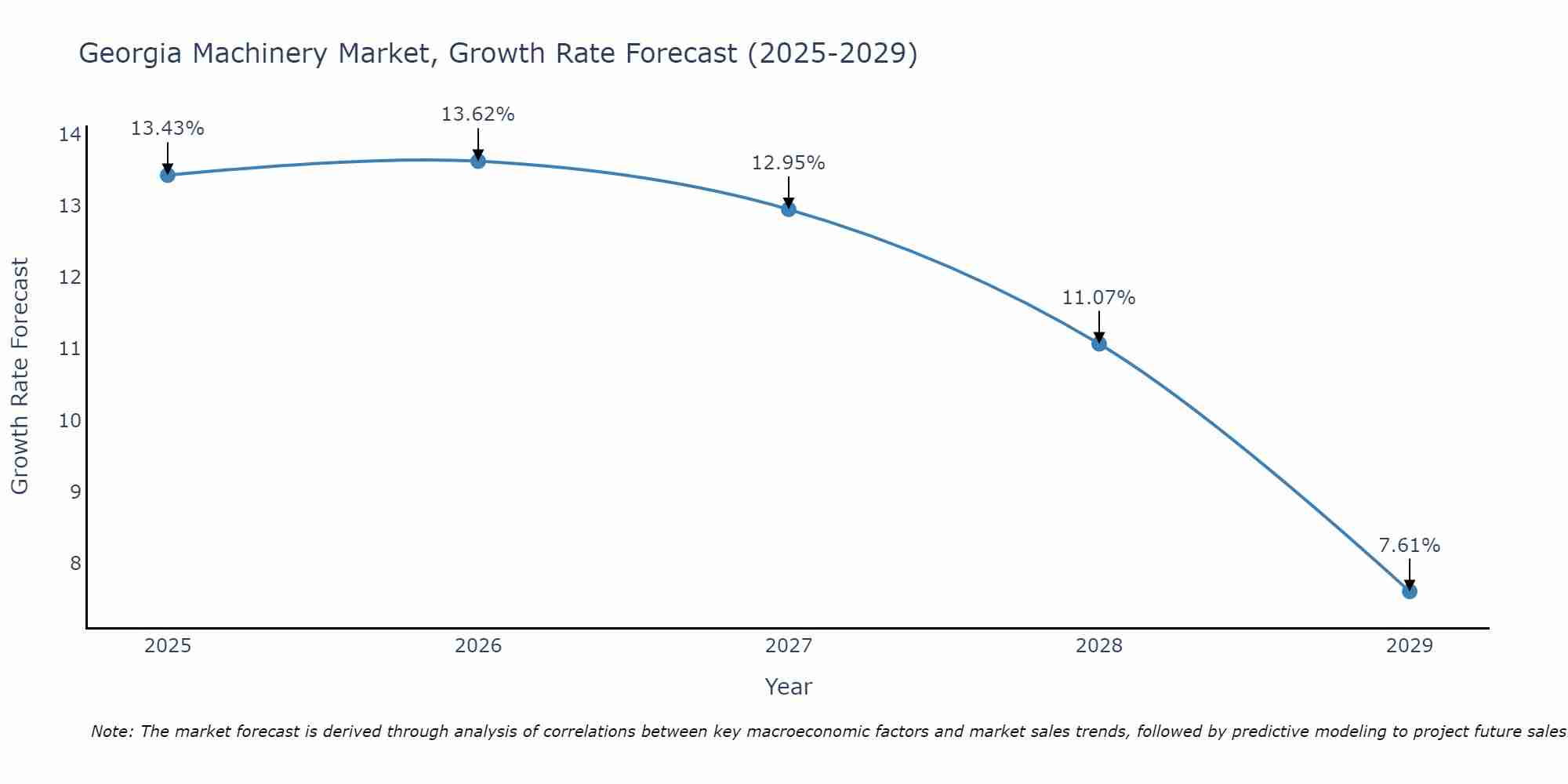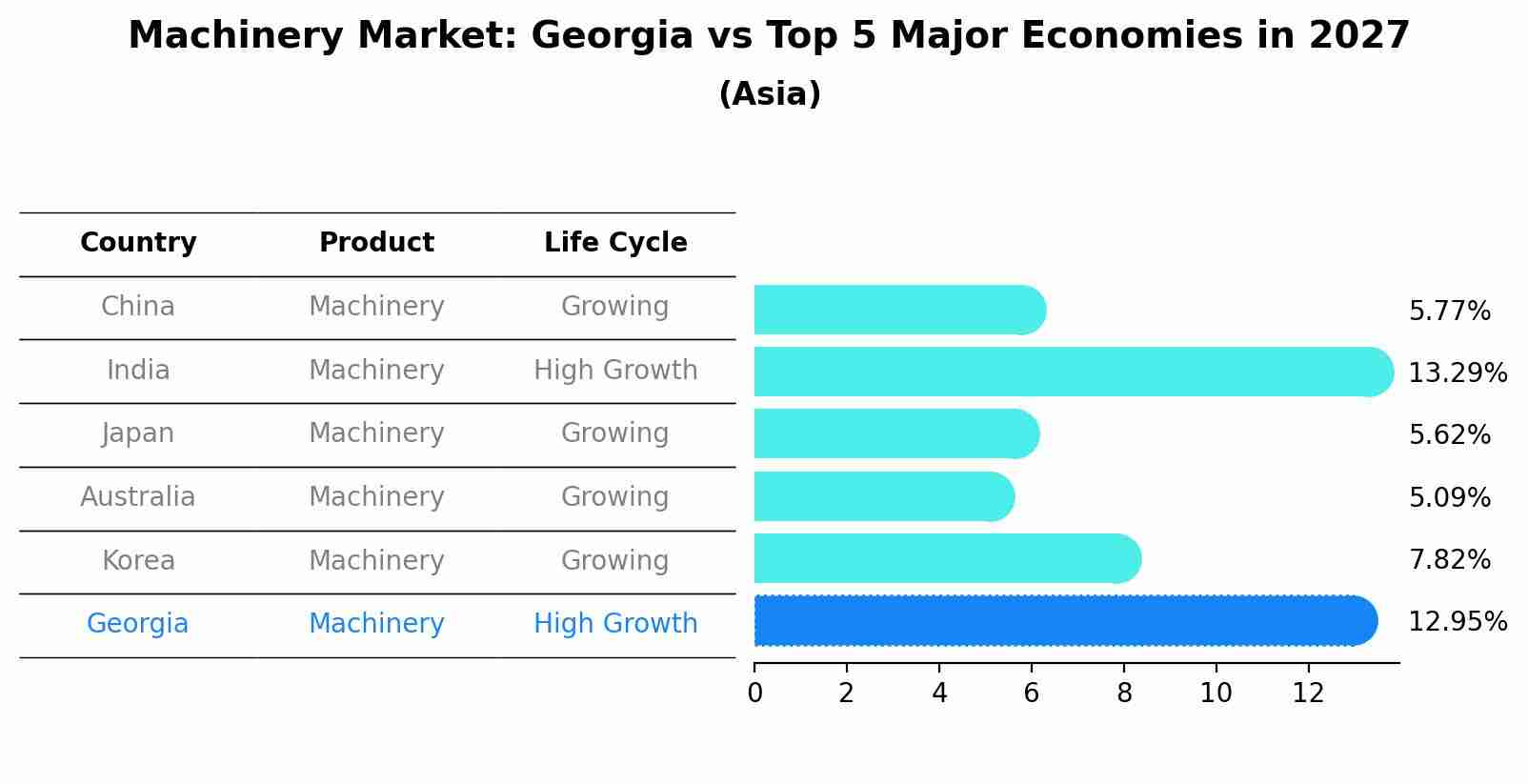Georgia Machinery Market Outlook | Forecast, Size, Growth, COVID-19 IMPACT, Trends, Share, Analysis, Companies, Revenue, Value & Industry
| Product Code: ETC433196 | Publication Date: Oct 2022 | Updated Date: Jul 2025 | Product Type: Market Research Report | |
| Publisher: 6Wresearch | Author: Dhaval Chaurasia | No. of Pages: 75 | No. of Figures: 35 | No. of Tables: 20 |
Georgia Machinery Market Size Growth Rate
The Georgia Machinery Market is projected to witness mixed growth rate patterns during 2025 to 2029. Growth accelerates to 13.62% in 2026, following an initial rate of 13.43%, before easing to 7.61% at the end of the period.

Machinery Market: Georgia vs Top 5 Major Economies in 2027 (Asia)
By 2027, Georgia's Machinery market is forecasted to achieve a high growth rate of 12.95%, with China leading the Asia region, followed by India, Japan, Australia and South Korea.

Georgia Machinery Market Synopsis
The Georgia Machinery Market is a dynamic industry that encompasses a wide range of products such as agricultural machinery, construction equipment, industrial machinery, and more. With a strong presence of manufacturing and construction sectors in the state, the demand for machinery remains robust. Key players in the market include both domestic manufacturers and international brands. Factors driving growth in the Georgia Machinery Market include infrastructure development projects, agricultural activities, and technological advancements leading to the adoption of more efficient machinery. Additionally, the state`s strategic location as a transportation hub further boosts the market by facilitating the movement of machinery across the region. Overall, the Georgia Machinery Market presents opportunities for manufacturers and suppliers to capitalize on the diverse needs of industries in the state.
Georgia Machinery Market Trends
The machinery market in Georgia is experiencing a shift towards advanced technology and automation. Key trends include the increasing adoption of smart machinery with IoT capabilities for improved monitoring and maintenance. There is also a growing demand for machinery that is energy-efficient and environmentally friendly, driven by sustainability concerns. Additionally, the market is witnessing a rise in the integration of digital solutions such as AI and machine learning to enhance productivity and efficiency. Manufacturers in Georgia are focusing on developing innovative machinery solutions to stay competitive in the market and meet the evolving needs of customers. Overall, the trend towards technology-driven solutions and sustainability is shaping the machinery market landscape in Georgia.
Georgia Machinery Market Challenges
In the Georgia machinery market, several challenges are faced by companies operating in the industry. One significant challenge is the increasing competition from both domestic and international manufacturers, leading to pricing pressures and the need for continuous innovation to stay competitive. Another challenge is the fluctuating raw material costs and supply chain disruptions, which can impact production costs and lead to pricing variability. Additionally, the industry is also affected by changing regulations and environmental standards, requiring companies to invest in sustainable practices and compliance measures. Overall, companies in the Georgia machinery market must navigate these challenges while also adapting to technological advancements and evolving customer demands to ensure long-term success in the highly competitive market.
Georgia Machinery Market Investment Opportunities
The Georgia Machinery Market offers attractive investment opportunities across various sectors such as agriculture, construction, and manufacturing. With the state`s strong focus on agriculture, investing in machinery and equipment for farming activities can be lucrative. Construction machinery is also in demand due to ongoing infrastructure projects and urban development. Additionally, the manufacturing sector in Georgia is growing, providing opportunities for investments in industrial machinery. Investing in innovative and sustainable machinery technologies can help businesses stay competitive in the market. Overall, the Georgia Machinery Market presents a diverse range of investment opportunities for those looking to capitalize on the state`s economic growth and industrial development.
Jordan Agar Market Government Policies
The Georgia Machinery Market is influenced by various government policies aimed at regulating the industry and promoting economic growth. These policies include import tariffs on machinery to protect domestic manufacturers, tax incentives for companies investing in new machinery, and regulations on environmental standards for machinery production. Additionally, the Georgia government has implemented programs to provide financial support and training for small and medium-sized machinery businesses to enhance their competitiveness in the global market. Overall, the government policies in Georgia related to the machinery market are geared towards fostering a favorable business environment, supporting innovation and technological advancement, and ensuring compliance with industry standards to drive growth in the sector.
Georgia Machinery Market Future Outlook
The future outlook for the Georgia Machinery Market appears optimistic due to several key factors. The state`s strong agricultural sector, coupled with a growing construction industry and increasing investments in infrastructure projects, are expected to drive demand for machinery and equipment. Additionally, Georgia`s strategic location as a transportation and logistics hub will continue to attract manufacturing companies, further fueling the market`s growth. Technological advancements in the machinery sector, such as automation and digitalization, are anticipated to enhance productivity and efficiency, offering opportunities for market expansion. Overall, the Georgia Machinery Market is poised for steady growth in the coming years, with a favorable business environment and supportive policies contributing to its development.
Key Highlights of the Report:
- Georgia Machinery Market Outlook
- Market Size of Georgia Machinery Market, 2021
- Forecast of Georgia Machinery Market, 2031
- Historical Data and Forecast of Georgia Machinery Revenues & Volume for the Period 2018 - 2031
- Georgia Machinery Market Trend Evolution
- Georgia Machinery Market Drivers and Challenges
- Georgia Machinery Price Trends
- Georgia Machinery Porter's Five Forces
- Georgia Machinery Industry Life Cycle
- Historical Data and Forecast of Georgia Machinery Market Revenues & Volume By Type for the Period 2018 - 2031
- Historical Data and Forecast of Georgia Machinery Market Revenues & Volume By Agriculture, Construction, And Mining Machinery for the Period 2018 - 2031
- Historical Data and Forecast of Georgia Machinery Market Revenues & Volume By Industrial Machinery for the Period 2018 - 2031
- Historical Data and Forecast of Georgia Machinery Market Revenues & Volume By Commercial And Service Industry Machinery for the Period 2018 - 2031
- Historical Data and Forecast of Georgia Machinery Market Revenues & Volume By Ventilation for the Period 2018 - 2031
- Historical Data and Forecast of Georgia Machinery Market Revenues & Volume By Heating for the Period 2018 - 2031
- Historical Data and Forecast of Georgia Machinery Market Revenues & Volume By Air-Conditioning for the Period 2018 - 2031
- Historical Data and Forecast of Georgia Machinery Market Revenues & Volume By Commercial Refrigeration Equipment for the Period 2018 - 2031
- Historical Data and Forecast of Georgia Machinery Market Revenues & Volume By Distribution Channel for the Period 2018 - 2031
- Historical Data and Forecast of Georgia Machinery Market Revenues & Volume By Supermarkets/Hypermarkets for the Period 2018 - 2031
- Historical Data and Forecast of Georgia Machinery Market Revenues & Volume By Convenience Stores for the Period 2018 - 2031
- Historical Data and Forecast of Georgia Machinery Market Revenues & Volume By E-Commerce for the Period 2018 - 2031
- Historical Data and Forecast of Georgia Machinery Market Revenues & Volume By Others for the Period 2018 - 2031
- Historical Data and Forecast of Georgia Machinery Market Revenues & Volume By Others for the Period 2018 - 2031
- Historical Data and Forecast of Georgia Machinery Market Revenues & Volume By Nature for the Period 2018 - 2031
- Historical Data and Forecast of Georgia Machinery Market Revenues & Volume By Organic for the Period 2018 - 2031
- Historical Data and Forecast of Georgia Machinery Market Revenues & Volume By Conventional for the Period 2018 - 2031
- Georgia Machinery Import Export Trade Statistics
- Market Opportunity Assessment By Type
- Market Opportunity Assessment By Distribution Channel
- Market Opportunity Assessment By Nature
- Georgia Machinery Top Companies Market Share
- Georgia Machinery Competitive Benchmarking By Technical and Operational Parameters
- Georgia Machinery Company Profiles
- Georgia Machinery Key Strategic Recommendations
Frequently Asked Questions About the Market Study (FAQs):
Export potential assessment - trade Analytics for 2030
Export potential enables firms to identify high-growth global markets with greater confidence by combining advanced trade intelligence with a structured quantitative methodology. The framework analyzes emerging demand trends and country-level import patterns while integrating macroeconomic and trade datasets such as GDP and population forecasts, bilateral import–export flows, tariff structures, elasticity differentials between developed and developing economies, geographic distance, and import demand projections. Using weighted trade values from 2020–2024 as the base period to project country-to-country export potential for 2030, these inputs are operationalized through calculated drivers such as gravity model parameters, tariff impact factors, and projected GDP per-capita growth. Through an analysis of hidden potentials, demand hotspots, and market conditions that are most favorable to success, this method enables firms to focus on target countries, maximize returns, and global expansion with data, backed by accuracy.
By factoring in the projected importer demand gap that is currently unmet and could be potential opportunity, it identifies the potential for the Exporter (Country) among 190 countries, against the general trade analysis, which identifies the biggest importer or exporter.
To discover high-growth global markets and optimize your business strategy:
Click Here- Single User License$ 1,995
- Department License$ 2,400
- Site License$ 3,120
- Global License$ 3,795
Search
Thought Leadership and Analyst Meet
Our Clients
Related Reports
- Saudi Arabia Car Window Tinting Film, Paint Protection Film (PPF), and Ceramic Coating Market (2025-2031) | Strategy, Consumer Insights, Analysis, Investment Trends, Opportunities, Growth, Size, Share, Industry, Revenue, Segments, Value, Segmentation, Supply, Forecast, Restraints, Outlook, Competition, Drivers, Trends, Demand, Pricing Analysis, Competitive, Strategic Insights, Companies, Challenges
- South Africa Stationery Market (2025-2031) | Share, Size, Industry, Value, Growth, Revenue, Analysis, Trends, Segmentation & Outlook
- Afghanistan Rocking Chairs And Adirondack Chairs Market (2026-2032) | Size & Revenue, Competitive Landscape, Share, Segmentation, Industry, Value, Outlook, Analysis, Trends, Growth, Forecast, Companies
- Afghanistan Apparel Market (2026-2032) | Growth, Outlook, Industry, Segmentation, Forecast, Size, Companies, Trends, Value, Share, Analysis & Revenue
- Canada Oil and Gas Market (2026-2032) | Share, Segmentation, Value, Industry, Trends, Forecast, Analysis, Size & Revenue, Growth, Competitive Landscape, Outlook, Companies
- Germany Breakfast Food Market (2026-2032) | Industry, Share, Growth, Size, Companies, Value, Analysis, Revenue, Trends, Forecast & Outlook
- Australia Briquette Market (2025-2031) | Growth, Size, Revenue, Forecast, Analysis, Trends, Value, Share, Industry & Companies
- Vietnam System Integrator Market (2025-2031) | Size, Companies, Analysis, Industry, Value, Forecast, Growth, Trends, Revenue & Share
- ASEAN and Thailand Brain Health Supplements Market (2025-2031) | Strategy, Consumer Insights, Analysis, Investment Trends, Opportunities, Growth, Size, Share, Industry, Revenue, Segments, Value, Segmentation, Supply, Forecast, Restraints, Outlook, Competition, Drivers, Trends, Demand, Pricing Analysis, Competitive, Strategic Insights, Companies, Challenges
- ASEAN Bearings Market (2025-2031) | Strategy, Consumer Insights, Analysis, Investment Trends, Opportunities, Growth, Size, Share, Industry, Revenue, Segments, Value, Segmentation, Supply, Forecast, Restraints, Outlook, Competition, Drivers, Trends, Demand, Pricing Analysis, Competitive, Strategic Insights, Companies, Challenges
Industry Events and Analyst Meet
Whitepaper
- Middle East & Africa Commercial Security Market Click here to view more.
- Middle East & Africa Fire Safety Systems & Equipment Market Click here to view more.
- GCC Drone Market Click here to view more.
- Middle East Lighting Fixture Market Click here to view more.
- GCC Physical & Perimeter Security Market Click here to view more.
6WResearch In News
- Doha a strategic location for EV manufacturing hub: IPA Qatar
- Demand for luxury TVs surging in the GCC, says Samsung
- Empowering Growth: The Thriving Journey of Bangladesh’s Cable Industry
- Demand for luxury TVs surging in the GCC, says Samsung
- Video call with a traditional healer? Once unthinkable, it’s now common in South Africa
- Intelligent Buildings To Smooth GCC’s Path To Net Zero


















